词性转换常见规律归纳
(完整版)词性转换常见规律归纳
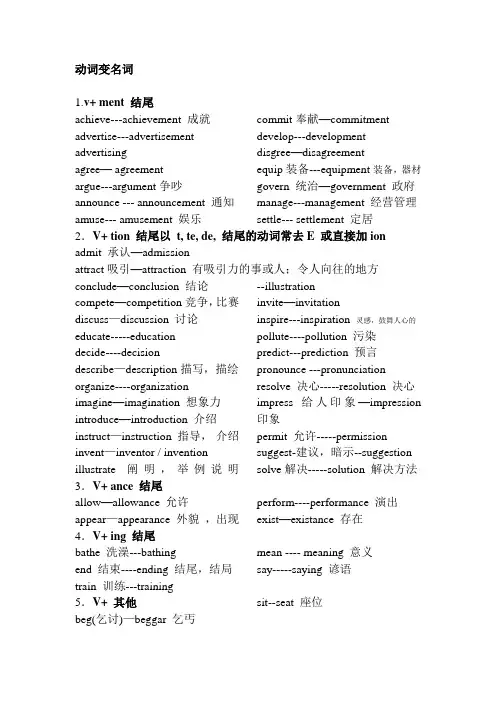
动词变名词1.v+ ment 结尾achieve---achievement 成就advertise---advertisement advertisingagree— agreementargue---argument争吵announce --- announcement 通知amuse--- amusement 娱乐commit奉献—commitment develop---development disgree—disagreementequip装备---equipment装备,器材govern 统治—government 政府manage---management 经营管理settle--- settlement 定居2.V+ tion 结尾以t, te, de, 结尾的动词常去E 或直接加ion admit 承认—admissionattract吸引—attraction 有吸引力的事或人;令人向往的地方conclude—conclusion 结论compete—competition竞争,比赛discuss—discussion 讨论educate-----educationdecide----decision describe—description描写,描绘organize----organization imagine—imagination 想象力introduce—introduction 介绍instruct—instruction 指导,介绍invent—inventor / invention illustrate 阐明,举例说明--illustrationinvite—invitationinspire---inspiration 灵感,鼓舞人心的pollute----pollution 污染predict---prediction 预言pronounce ---pronunciation resolve 决心-----resolution 决心impress 给人印象—impression 印象permit 允许-----permission suggest-建议,暗示--suggestion solve解决-----solution 解决方法3.V+ ance 结尾allow—allowance 允许appear—appearance 外貌,出现perform----performance 演出exist—existance 存在4.V+ ing 结尾bathe 洗澡---bathingend 结束----ending 结尾,结局train 训练---training mean ---- meaning 意义say-----saying 谚语5.V+ 其他beg(乞讨)—beggar 乞丐sit--seat 座位employ--employer 雇主,老板--employee雇员believe—belief 信仰behave 行为,举止----behavior know---knowledgefly—flight 飞行heat 加热---heat 热量hit 撞击------hit 轰动一时的人或物,碰撞mix 混合-----mixture 混合物press 按,压—pressure 压力receive—receptionist 接待员serve—service 服务succeed-- successtour 在-----旅游- tourist 游客pursue—pursuit 追求,从事propose—proposal 建议withdraw—withdrawal 取钱;收回;撤退survive—survival--survivor 幸存者arrive-- arrival到达analyze—analysis 分析名词变形容词1名词+yanger 生气-----angry honest—honesty 诚实的hunger---hungry fog—foggy有雾的fur----furry 毛皮的guilt 罪恶---guilty 内疚的health---healthyluck---luckycloud---cloudy wind—windy rain---rainysnow---snowysun—sunnytourist------touristy 游客多的business---busysalt 盐--- salty 咸的shine---shiny 发亮的silk 丝绸—silky 丝绸般的sleep---sleepy 昏昏欲睡的taste 口味,品味------tasty 甜的2.名词+ edbalance –balanced 平衡的spot 斑点,地点----spotted 有斑点的talent-----talented 有天赋的organized 有组织的distusted 厌恶的offended 生气的crowded 拥挤的polluted 被污染的pleased 高兴的3.名词+ ful/lessmeaning—meaningful 有意义的care—careful/ careless 小心的;粗心的help---helpful / helplesshome—homeless 无家可归的colour---colourfulpain 疼痛---painful 痛苦的use---useless/ useful thank—thankful 充满感激的peace 和平---- peaceful 平静的,宁静的playful 顽皮的,爱玩耍的4.名词+ ableadjustable 可调整的comfort---comfortable knowledge---knowledgeable suit 一套-----suitable 合适的5.名词+ ous courage—courageous 勇敢的danger—dangerousmystery 神秘-----mysterious 神秘的6.ce 变t confidence----confident difference---different dependence—dependent independence--independent7. al 结尾Addition—additional 附加的,额外的Class—classical 经典的medicine 药----medical 医学的music---musicalnature---natural 自然的person---personal (私人的) nation—national 国家的education---educational有教育意义的tradition----traditional 传统的origin起源---original 新颖的;独创的grammar—grammatical 语法的globe—global 全球的8.名词+ lyfriend—friendlylive---lively 活跃的,有生气的love—lovely 可爱的9.+ en 结尾wood—wooden 木制的wool—woolen 羊毛的10. 其他energy精力---energetic strategy—strategic 战略的fool 傻子—foolish 愚蠢的freedom 自由—free 空的,免费的height 高度—high illness 疾病--- ill love—loving 慈爱的death---deadpleasure---pleasant / pleased popularity 流行性—popular pride---proudscientist----scientific 科学的形容词变副词1.形容词+ lybad—badlybright—brightly 明亮地casual—casually 随意地clear—clearly 清楚地complete—completely 完全correct---correctly 正确地final--finally fortunate—fortunately幸运地general—generally 一般来讲loud—loudlyparticular 特殊的,独特的—particularlypolite—politelyproper 合适的-,恰当的---properlymain------mainly 主要地most 多数-----mostly 多半,大多数normal---normally 正常地quick—quicklyquiet—quietly 轻轻地,安静地real—reallyrecent 最近的----recently 最近;近来hard 难的;努力地---hardly几乎不late 迟的—lately 最近;近来sad--sadlyslow---slowly special—specially 专门,特殊地specific---specifically特定地,明确地strong—strongly 坚决地,强烈地sudden—suddenly突然usual—usually2. 以le 结尾的去e + ycomfortable---comfortably gentle—gentlypossible---possibly simple ----simply 仅仅;只;简单地terrible---terribly3. 辅音字母+ y 变ilyeasy—easilyheavy—heavilyhappy--happily4.特殊good—well好地well 身体健康的,井true—truly形容词变名词efficient有效率的—efficiency 效率patient—patience/impatience dependent—dependenc依赖性independent—independency 独立性true—truth high—height wide—width long—lengthpossible—possibilityresponsible—responsibilityurgent—urgency 紧急prosperous—prosperity 繁荣accurate—accuracy 准确性形容词变动词modern—modernize social--socialize fast--fasten short/shorten long—lengthen—length(n.) wide--widen less--lessenstrong—strengthen—strength(n.)large—enlarge名词变动词computer--computerize名词---形容词—副词beauty 美,美人—beautiful—beautifully care—careful—carefully care—careless—carelessly difference---different---differently fortune—fortunate—fortunately/u nfortunately happiness—happy—happily hunger—hungry--hungrily health—healthy—healthily luck—lucky—luckily noise—noisy—noisily pride—proud—proudly骄傲地sadness—sad—sadlysafety 安全;安全的地方—safe —safelysilence—silent---silently 默默地success—successful—successfully truth—true—truly unluck—unlucky—unluckily wonder 奇迹—wonderful—wonderfully方位的词名词—形容词East—eastern West—westernSouth—southern North---northern In the west of ChinaIn the western part of China四大洲名词-----形容词Asia 亚洲–---- AsianAfrica 非洲----- AfricanEurope欧洲----- European America 美洲-----American既是形容词又是副词early get up early ;an early trainlate be late for classcome late for schooldeep dive deep into the seaa hole deep largehigh jump high;a high mountainhard a hard question;a hard stone work hard / study hardrain hardlong It takes too longIt takes a long timefar jump farMy home is far from school straight a straight linego straight along here。
词性转换归纳总结初中语文
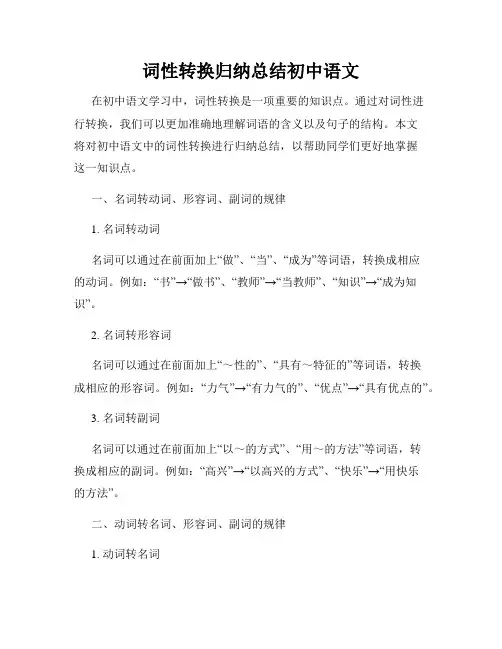
词性转换归纳总结初中语文在初中语文学习中,词性转换是一项重要的知识点。
通过对词性进行转换,我们可以更加准确地理解词语的含义以及句子的结构。
本文将对初中语文中的词性转换进行归纳总结,以帮助同学们更好地掌握这一知识点。
一、名词转动词、形容词、副词的规律1. 名词转动词名词可以通过在前面加上“做”、“当”、“成为”等词语,转换成相应的动词。
例如:“书”→“做书”、“教师”→“当教师”、“知识”→“成为知识”。
2. 名词转形容词名词可以通过在前面加上“~性的”、“具有~特征的”等词语,转换成相应的形容词。
例如:“力气”→“有力气的”、“优点”→“具有优点的”。
3. 名词转副词名词可以通过在前面加上“以~的方式”、“用~的方法”等词语,转换成相应的副词。
例如:“高兴”→“以高兴的方式”、“快乐”→“用快乐的方法”。
二、动词转名词、形容词、副词的规律1. 动词转名词动词可以通过在后面加上“~的人”、“~的地方”等词语,转换成相应的名词。
例如:“读书”→“读书的人”、“写字”→“写字的地方”。
2. 动词转形容词动词可以通过在后面加上“~的”、“具有~特征的”等词语,转换成相应的形容词。
例如:“忍受”→“能忍受的”、“感动”→“具有感动特征的”。
3. 动词转副词动词可以通过在后面加上“以~的方式”、“用~的方法”等词语,转换成相应的副词。
例如:“高兴”→“以高兴的方式”、“快乐”→“用快乐的方法”。
三、形容词转名词、动词、副词的规律1. 形容词转名词形容词可以通过在后面加上“~的人”、“~的对象”等词语,转换成相应的名词。
例如:“聪明”→“聪明的人”、“美丽”→“美丽的对象”。
2. 形容词转动词形容词可以通过在前面加上“使得”、“让”、“将”等词语,转换成相应的动词。
例如:“干净”→“使得干净”、“光滑”→“让光滑”。
3. 形容词转副词形容词可以通过在后面加上“以~的方式”、“用~的方法”等词语,转换成相应的副词。
词性转换规律
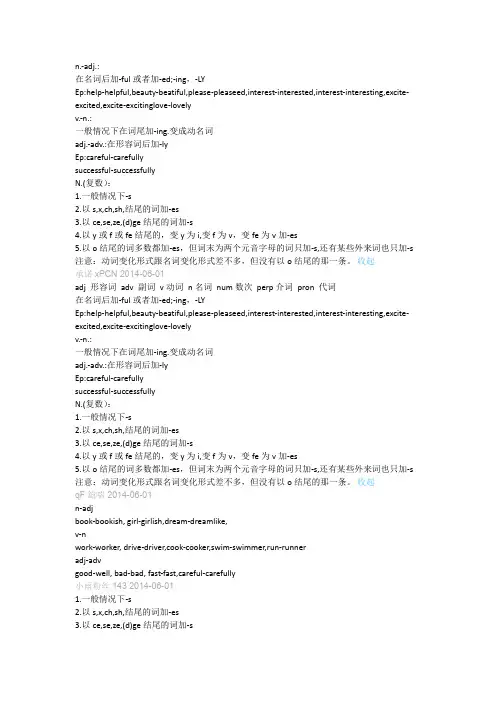
n.-adj.:在名词后加-ful或者加-ed;-ing,-LYEp:help-helpful,beauty-beatiful,please-pleaseed,interest-interested,interest-interesting,excite-ex cited,excite-excitinglove-lovelyv.-n.:一般情况下在词尾加-ing.变成动名词adj.-adv.:在形容词后加-lyEp:careful-carefullysuccessful-successfullyN.(复数):1.一般情况下-s2.以s,x,ch,sh,结尾的词加-es3.以ce,se,ze,(d)ge结尾的词加-s4.以y或f或fe结尾的,变y为i,变f为v,变fe为v加-es5.以o结尾的词多数都加-es,但词末为两个元音字母的词只加-s,还有某些外来词也只加-s 注意:动词变化形式跟名词变化形式差不多,但没有以o结尾的那一条。
收起承诺xPCN 2014-06-01adj形容词adv副词v动词n名词num数次perp介词pron代词在名词后加-ful或者加-ed;-ing,-LYEp:help-helpful,beauty-beatiful,please-pleaseed,interest-interested,interest-interesting,excite-ex cited,excite-excitinglove-lovelyv.-n.:一般情况下在词尾加-ing.变成动名词adj.-adv.:在形容词后加-lyEp:careful-carefullysuccessful-successfullyN.(复数):1.一般情况下-s2.以s,x,ch,sh,结尾的词加-es3.以ce,se,ze,(d)ge结尾的词加-s4.以y或f或fe结尾的,变y为i,变f为v,变fe为v加-es5.以o结尾的词多数都加-es,但词末为两个元音字母的词只加-s,还有某些外来词也只加-s 注意:动词变化形式跟名词变化形式差不多,但没有以o结尾的那一条。
初中英语词性转换规律总结与应试技巧
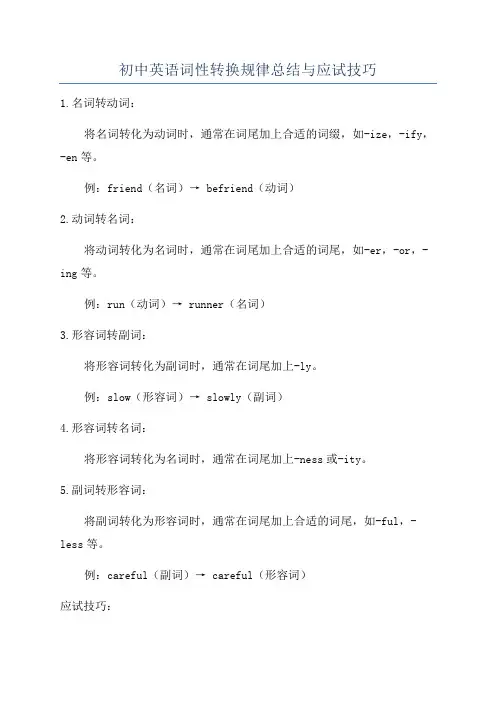
初中英语词性转换规律总结与应试技巧
1.名词转动词:
将名词转化为动词时,通常在词尾加上合适的词缀,如-ize,-ify,-en等。
例:friend(名词)→ befriend(动词)
2.动词转名词:
将动词转化为名词时,通常在词尾加上合适的词尾,如-er,-or,-ing等。
例:run(动词)→ runner(名词)
3.形容词转副词:
将形容词转化为副词时,通常在词尾加上-ly。
例:slow(形容词)→ slowly(副词)
4.形容词转名词:
将形容词转化为名词时,通常在词尾加上-ness或-ity。
5.副词转形容词:
将副词转化为形容词时,通常在词尾加上合适的词尾,如-ful,-less等。
例:careful(副词)→ careful(形容词)
应试技巧:
1.注意词根词缀的变化,有时候词性转换还会伴随着词根的变化。
2.大多数常见的词性转换规律都已掌握,但仍需多练习和记忆,积累的是经验。
3.定期回顾已学习过的词性转换规律,形成记忆,提高应对考试的能力。
4.在考试前,可以查阅常见的词性转换规律,熟悉一些常考的单词词性转换,增加应对考试的信心。
英语单词词性转换的基本规律
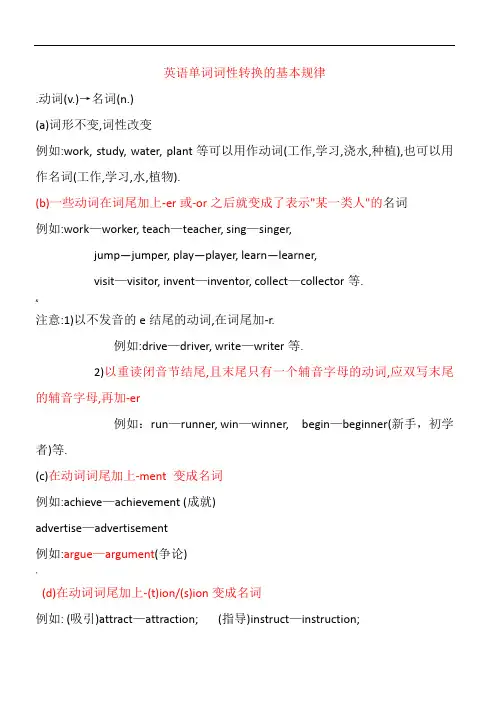
英语单词词性转换的基本规律.动词(v.)→名词(n.)(a)词形不变,词性改变例如:work, study, water, plant等可以用作动词(工作,学习,浇水,种植),也可以用作名词(工作,学习,水,植物).(b)一些动词在词尾加上-er或-or之后就变成了表示"某一类人"的名词例如:work—worker, teach—teacher, sing—singer,jump—jumper, play—player, learn—learner,visit—visitor, invent—inventor, collect—collector等.&注意:1)以不发音的e结尾的动词,在词尾加-r.例如:drive—driver, write—writer等.2)以重读闭音节结尾,且末尾只有一个辅音字母的动词,应双写末尾的辅音字母,再加-er例如:run—runner, win—winner, begin—beginner(新手,初学者)等.(c)在动词词尾加上-ment 变成名词例如:achieve—achievement (成就)advertise—advertisement例如:argue—argument(争论)*(d)在动词词尾加上-(t)ion/(s)ion变成名词例如: (吸引)attract—attraction; (指导)instruct—instruction;invent—invention discuss(讨论)—discussion;express(表达)—expression educate—education;graduate—graduation; operate(操作,动手术)—operation (去e再加"ion")compete(竞赛,比赛)—competition;organize—organization (把e改成其他字母再加"tion")decide—decision conclude(结束,推断,决定)—conclusion (结论,结局) (把de改为s再加"ion")describe—description描写,描绘(这是特例,不规则变化)!(e)在动词词尾加上-ance变成名词例如: appear—appearance (外貌;出现)Perform(表演)—performance (演出)accept—acceptance (接受)(f)在动词词尾加-ing变成名词(方法与动词变为现在分词的方法相同)例如:meet(遇见)—meeting(会议) build—building wait—waitingbathe—bathing say—saying(谚语) mean—meaning(意义,含义)end(结束) —ending(结尾,结局) train(火车,训练) —training(训练) wash(洗涤)—washing…注意:以重读闭音节结尾,且末尾只有一个辅音字母的动词,应双写末尾的辅音字母,再加-ing如:swim—swimming shop—shopping begin—beginning(g)其他一些比较特殊的变化例如: Beg(乞讨)—beggar(乞丐) behave(行为举止)—behavior know(知道)—knowledge(知识) fly—flight (飞行)heat (加热)—heat(热量) hit (撞击)—hit( 轰动一时的人或物,碰撞)mix (混合)—mixture(混合物) press(按,压)—pressure(压力)(sit(坐)—seat (座位) succeed—success(成功)tour—tour(旅游)/ tourist (游客)2.动词(v.)→形容词(adj.)(a)动词后面加able,以e结尾的动词则去e加able,表示具有此性质,特点或属性.例如: afford-affordable(负担得起);love-lovable(可爱的)(b)动词后面加ed,以e结尾的动词则直接加d,表示被动性的属性或特点.例如: scatter(分散,散开)-scattered use-used(c)不规则的动词则必须记忆,记住其过去分词形式.规律不大,意义同(b).(3.名词(n.)→形容词(adj.)(a)在名词后面加-y可以变成形容词(尤其是一些与天气有关的名词)例如: rain—rainy, cloud—cloudy(多云的,阴天的), wind—windy, snow—snowy, health—healthy, luck—lucky, anger—angry guilt—guilty(内疚的)tourist—touristy(游客多的) , salt (盐)—salty (咸的)silk(丝绸)—silky(丝绸般的), sleep—sleepy (昏昏欲睡的)注意:1)如果以重读闭音节结尾,且词尾只有一个辅音字母,这时应双写辅音字母再加"-y".如: sun—sunny, fun—funny, fog—foggy(有雾的), fur(毛,毛皮)—furry(毛皮的)$2)少数以不发音的e结尾的名词变为形容词时,应去掉e再加"-y".如: noise—noisy, ice—icy, shine—shiny(发亮的), taste(口味)—tasty(甜的) (b)名词后面加-ed,以e结尾的直接加d.例如: spot(斑点)—spotted(有斑点的); talent—talented (有天赋的) organize—organized 有组织的; balance—balanced(平衡的)(c)一些抽象名词在词尾加-ful可以变为形容词例如:care—careful, thank—thankful, help—helpful,use—useful, meaning—meaningful…(d)在名词后加-less构成含有否定意义的形容词例如:care—careless(粗心的), use—useless(无用的)hope—hopeless(没希望的),home—homeless(无家可归的)(e)一些以-ce结尾的名词,把-ce改为-t变成形容词例如: difference—different, silence(沉默,寂静,无言)—silent, confidence—confident(f).在名词后加-ly变为形容词例如: friend—friendly, love—lovely(可爱的), live---lively (活泼的)(g).在名词后加-ous变为形容词{例如: danger—dangerous(h)名词后面加-al变为形容词例如: music—musical; medicine(药,医学)—medical(医学的)(这个比较特殊)(i)名词后面加-able变为形容词,如果以e结尾就去e再加"-able".例如: adjust—adjustable 可调整的value—valuable有价值的(j)名词后面加-en变成形容词例如: wood—wooden 木制的wool—woolen 羊毛的。
词性转换规律
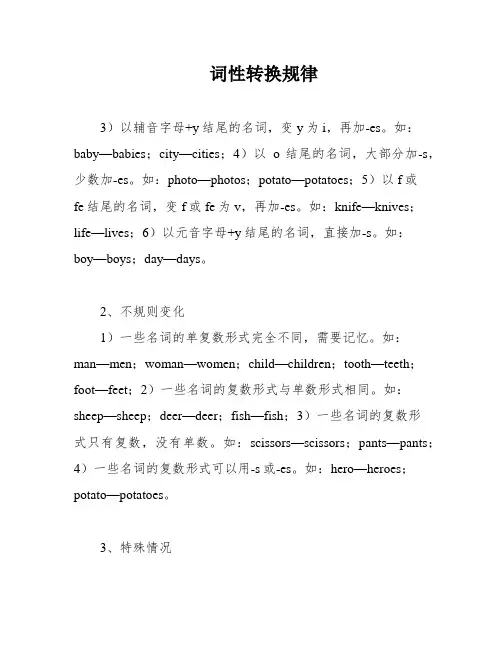
词性转换规律3)以辅音字母+y结尾的名词,变y为i,再加-es。
如:baby—babies;city—cities;4)以o结尾的名词,大部分加-s,少数加-es。
如:photo—photos;potato—potatoes;5)以f或fe结尾的名词,变f或fe为v,再加-es。
如:knife—knives;life—lives;6)以元音字母+y结尾的名词,直接加-s。
如:boy—boys;day—days。
2、不规则变化1)一些名词的单复数形式完全不同,需要记忆。
如:man—men;woman—women;child—children;tooth—teeth;foot—feet;2)一些名词的复数形式与单数形式相同。
如:sheep—sheep;deer—deer;fish—fish;3)一些名词的复数形式只有复数,没有单数。
如:scissors—scissors;pants—pants;4)一些名词的复数形式可以用-s或-es。
如:hero—heroes;potato—potatoes。
3、特殊情况1)有些名词的复数形式有两种,但含义不同。
如:brother—brothers(兄弟),brethren(同教会的);die—dies (模具),dice(骰子);2)有些名词的复数形式有两种,但用法不同。
如:XXX(衣服)在表示“一件衣服”时,是不可数名词,没有复数形式;但在表示“衣服”时,是可数名词,有复数形式。
To form XXX + y。
change y to i and add es。
For example。
baby es babies。
city es cities。
and family es families.To form the plural of words ending in f or fe。
change f or fe to ves。
For example。
XXX。
XXX。
英语单词词性转换的基本规律
英语单词词性转换的基本规律一词性变换的一般的规律1.动词(v.)→名词(n.)(a)词形不变,词性改变work, study, water, plant等可以用作动词(工作,学习,浇水,种植),也可以用作名词(工作,学习,水,植物).(b)一些动词在词尾加上-er或-or之后就变成了表示"某一类人"的名词例如:work—worker, teach—teacher, sing—singer, jump—jumper, play—player, learn—learner, visit—visitor, invent—inventor,collect—collector等.注意:1)以不发音的e结尾的动词,在词尾加-r.例如:drive—driver, write—writer等.2)以重读闭音节结尾,且末尾只有一个辅音字母的动词,应双写末尾的辅音字母,再加-er例如:run—runner, win—winner,begin—beginner等.(c)在动词词尾加上-ment 变成名词例如:achieve—achievement (成就) advertise—advertisement(广告) agree—agreement disagree—disagreementamuse—amusement (娱乐) improve—improvement(争吵)commit(奉献)—commitment develop—development (发展)depart—department (局,部) govern(统治)—government(政府)manage—management (管理) equip—equipment (装备)有些单词比较特殊,需把动词后的e去掉再加ment.例如:argue—argument(争论)(d)在动词词尾加上-(t)ion/(s)ion变成名词例如: attract—attraction; instruct—instruction;invent—invention discuss—discussion;express—expression educate—education;graduate—graduation; operate—operation (去e再加"ion")compete—competition; organize—organization (把e改成其他字母再加"tion") decide—decision conclude—conclusion (把de改为s再加"ion")describe—description描写,描绘(这是特例,不规则变化)(e)在动词词尾加上-ance变成名词例如: appear—appearance (外貌;出现) perform—performance (演出)accept—acceptance (接受)(f)在动词词尾加-ing变成名词(方法与动词变为现在分词的方法相同)例如: meet—meeting build—building wait—waitingbathe—bathing say—saying(谚语) mean—meaningend —ending train —training wash—washing注意:以重读闭音节结尾,且末尾只有一个辅音字母的动词,应双写末尾的辅音字母,再加-ing如:swim—swimming shop—shopping begin—beginning(g)其他一些比较特殊的变化例如: Beg(乞讨)—beggar(乞丐) behave(行为举止)—behaviorknow(知道)—knowledge(知识) fly—flight (飞行)heat (加热)—heat(热量) hit (撞击)—hit( 轰动一时的人或物,碰撞)mix (混合)—mixture(混合物) press(按,压)—pressure(压力)sit(坐)—seat (座位) succeed—success(成功)tour—tour(旅游)/ tourist (游客)2.动词(v.)→形容词(adj.)(a)动词后面加able,以e结尾的动词则去e加able,表示具有此性质,特点或属性.例如: afford-affordable;love-lovable(b)动词后面加ed,以e结尾的动词则直接加d,表示被动性的属性或特点.例如: scatter-scattered use-used(c)不规则的动词则必须记忆,记住其过去分词形式.规律不大,意义同(b).3.名词(n.)→形容词(adj.)(a)在名词后面加-y可以变成形容词(尤其是一些与天气有关的名词)例如: rain—rainy, cloud—cloudy, wind—windy, snow—snowy,health—healthy, luck—lucky,anger—angry guilt—guilty(内疚的)tourist—touristy(游客多的) , salt (盐)—salty (咸的)silk(丝绸)—silky(丝绸般的), sleep—sleepy (昏昏欲睡的)注意:1)如果以重读闭音节结尾,且词尾只有一个辅音字母,这时应双写辅音字母再加"-y". 如: sun —sunny, fun—funny, fog—foggy(有雾的), fur—furry(毛皮的)2)少数以不发音的e结尾的名词变为形容词时,应去掉e再加"-y".如: noise—noisy, ice—icy, shine—shiny(发亮的), taste(口味)—tasty(甜的)(b)名词后面加-ed,以e结尾的直接加d.例如: spot(斑点)—spotted(有斑点的); talent—talented (有天赋的)organize—organized 有组织的; balance—balanced(平衡的)(c)一些抽象名词在词尾加-ful可以变为形容词例如:care—careful, thank—thankful, help—helpful,use—useful, meaning—meaningful(d)在名词后加-less构成含有否定意义的形容词例如:care—careless(粗心的), use—useless(无用的)hope—hopeless(没希望的),home—homeless(无家可归的)(e)一些以-ce结尾的名词,把-ce改为-t变成形容词例如: difference—different, silence—silent, confidence—confident(f).在名词后加-ly变为形容词例如: friend—friendly, love—lovely, live---lively(g).在名词后加-ous变为形容词例如: danger—dangerous(h)名词后面加-al变为形容词例如: music—musical; medicine—medical (这个比较特殊)(i)名词后面加-able变为形容词,如果以e结尾就去e再加"-able".例如: adjust—adjustable 可调整的value—valuable有价值的(j)名词后面加-en变成形容词例如: wood—wooden 木制的wool—woolen 羊毛的(k)一些表示国家的名词可以在词尾加-ese, -ish或-n构成表示国籍,语言的形容词例如:China—Chinese, Japan—Japanese, England—English,America—American, India—Indian, Australia —Australian (注意Canada—Canadian)4.形容词(adj.)→副词(adv.)▲一般在形容词的词尾加-ly可以变成副词例如: quick—quickly, slow—slowly, loud—loudly, sudden—suddenly 等但是,以下几点值得注意:(a) 一些以"辅音字母+y"结尾的形容词,要把y改为i再加-ly例如: happy—happily, angry—angrily, lucky—luckily, heavy—heavily, noisy—noisily(b) 有些以-ble或-le结尾的形容词,去掉e加-y例如:possible—possibly, terrible—terribly(c)少数以e结尾的形容词,要去掉e再加-ly例如: true—truly但绝大多数以e结尾的形容词仍然直接加-ly 例如: polite—politely, wide—widely(d)以-l结尾的形容词变为副词时要在词尾加-ly,以-ll结尾的才在词尾只加-y.例如: usual—usually, careful—carefully, useful—usefullyfull—fully (以-ll结尾的才只加y)二. 派生:指由一个词根加上前缀和(或)后缀构成另一个词的构词形式。
英语词性转换
英语单词词性转换的基本规律。
动词(v.)→名词(n。
)(a)词形不变,词性改变例如:work, study, water, plant等可以用作动词(工作,学习,浇水,种植),也可以用作名词(工作,学习,水,植物).(b)一些动词在词尾加上—er或—or之后就变成了表示"某一类人”的名词例如:work—worker, teach—teacher, sing—singer,jump—jumper, play—player, learn—learner,visit—visitor, invent-inventor,collect-collector等。
注意:1)以不发音的e结尾的动词,在词尾加-r。
例如:drive—driver, write—writer等.2)以重读闭音节结尾,且末尾只有一个辅音字母的动词,应双写末尾的辅音字母,再加-er例如:run—runner, win—winner,begin—beginner等.(c)在动词词尾加上-ment 变成名词例如:achieve—achievement (成就)advertise—advertisement//advertising(广告)agree-agreement disgree—disagreementamuse—amusement (娱乐) improve—improvement(争吵)commit(奉献)—commitment develop—development (发展)depart—department (局,部) govern(统治)—government(政府)manage-management (管理) equip—equipment (装备)有些单词比较特殊,需把动词后的e去掉再加ment.例如:argue-argument(争论)(d)在动词词尾加上—(t)ion/(s)ion变成名词例如: attract—attraction; instruct—instruction;invent—invention discuss—discussion;express—expression educate—education;graduate—graduation; operate—operation (去e再加"ion”)compete—competition; organize-organization (把e改成其他字母再加”tion")decide—decision conclude—conclusion (把de改为s再加"ion")describe—description描写,描绘(这是特例,不规则变化)(e)在动词词尾加上-ance变成名词例如: appear-appearance (外貌;出现)perform—performance (演出)accept—acceptance (接受)(f)在动词词尾加-ing变成名词(方法与动词变为现在分词的方法相同)例如:meet—meeting build—building wait—waitingbathe—bathing say—saying(谚语) mean—meaningend -ending train —training wash—washing注意:以重读闭音节结尾,且末尾只有一个辅音字母的动词,应双写末尾的辅音字母,再加-ing如:swim—swimming shop—shopping begin—beginning(g)其他一些比较特殊的变化例如: Beg(乞讨)—beggar(乞丐) behave(行为举止)—behaviorknow(知道)—knowledge(知识) fly-flight (飞行)heat (加热)—heat(热量) hit (撞击)—hit(轰动一时的人或物,碰撞)mix (混合)-mixture(混合物) press(按,压)—pressure(压力)sit(坐)-seat (座位) succeed—success(成功)tour—tour(旅游)/ tourist (游客)2.动词(v.)→形容词(adj。
英语单词词性转换的基本规律
英语单词词性转换的基本规律集团档案编码:[YTTR-YTPT28-YTNTL98-UYTYNN08]英语单词词性转换的基本规律一词性变换的一般的规律1.动词(v.)→名词(n.)(a)词形不变,词性改变work,study,water,plant等可以用作动词(工作,学习,浇水,种植),也可以用作名词(工作,学习,水,植物).(b)一些动词在词尾加上-er或-or之后就变成了表示"某一类人"的名词例如:work—worker,teach—teacher,sing—singer,jump—jumper,play—player,learn—learner,visit—visitor,invent—inventor,collect—collector等.注意:1)以不发音的e结尾的动词,在词尾加-r.例如:drive—driver,write—writer等.2)以重读闭音节结尾,且末尾只有一个辅音字母的动词,应双写末尾的辅音字母,再加-er 例如:run—runner,win—winner,begin—beginner等.(c)在动词词尾加上-ment变成名词例如:achieve—achievement(成就)advertise—advertisement(广告) agree—agreementdisagree—disagreementamuse—amusement(娱乐)improve—improvement(争吵)commit(奉献)—commitmentdevelop—development(发展)depart—department(局,部)govern(统治)—government(政府) manage—management(管理)equip—equipment(装备)有些单词比较特殊,需把动词后的e去掉再加ment.例如:argue—argument(争论) (d)在动词词尾加上-(t)ion/(s)ion变成名词例如:attract—attraction;instruct—instruction;invent—inventiondiscuss—discussion;express—expressioneducate—education;graduate—graduation;operate—operation(去e再加"ion") compete—competition;organize—organization(把e改成其他字母再加"tion") decide—decisionconclude—conclusion(把de改为s再加"ion") describe—description描写,描绘(这是特例,不规则变化)(e)在动词词尾加上-ance变成名词例如:appear—appearance(外貌;出现)perform—performance(演出) accept—acceptance(接受)(f)在动词词尾加-ing变成名词(方法与动词变为现在分词的方法相同)例如:meet—meetingbuild—buildingwait—waitingbathe—bathingsay—saying(谚语)mean—meaning end—endingtrain—trainingwash—washing注意:以重读闭音节结尾,且末尾只有一个辅音字母的动词,应双写末尾的辅音字母,再加-ing如:swim—swimmingshop—shoppingbegin—beginning(g)其他一些比较特殊的变化例如:Beg(乞讨)—beggar(乞丐)behave(行为举止)—behaviorknow(知道)—knowledge(知识)fly—flight(飞行)heat(加热)—heat(热量)hit(撞击)—hit(轰动一时的人或物,碰撞)mix(混合)—mixture(混合物)press(按,压)—pressure(压力)sit(坐)—seat(座位)succeed—success(成功)tour—tour(旅游)/tourist(游客)2.动词(v.)→形容词(adj.)(a)动词后面加able,以e结尾的动词则去e加able,表示具有此性质,特点或属性.例如:afford-affordable;love-lovable(b)动词后面加ed,以e结尾的动词则直接加d,表示被动性的属性或特点.例如:scatter-scattereduse-used(c)不规则的动词则必须记忆,记住其过去分词形式.规律不大,意义同(b).3.名词(n.)→形容词(adj.)(a)在名词后面加-y可以变成形容词(尤其是一些与天气有关的名词)例如:rain—rainy,cloud—cloudy,wind—windy,snow—snowy,health—healthy,luck—lucky,anger—angryguilt—guilty(内疚的)tourist—touristy(游客多的),salt(盐)—salty(咸的)silk(丝绸)—silky(丝绸般的),sleep—sleepy(昏昏欲睡的)注意:1)如果以重读闭音节结尾,且词尾只有一个辅音字母,这时应双写辅音字母再加"-y".如:sun—sunny,fun—funny,fog—foggy(有雾的),fur—furry(毛皮的)2)少数以不发音的e结尾的名词变为形容词时,应去掉e再加"-y".如:noise—noisy,ice—icy,shine—shiny(发亮的),taste(口味)—tasty(甜的)(b)名词后面加-ed,以e结尾的直接加d.例如:spot(斑点)—spotted(有斑点的);talent—talented(有天赋的) organize—organized有组织的;balance—balanced(平衡的)(c)一些抽象名词在词尾加-ful可以变为形容词例如:care—careful,thank—thankful,help—helpful,use—useful,meaning—meaningful(d)在名词后加-less构成含有否定意义的形容词例如:care—careless(粗心的),use—useless(无用的)hope—hopeless(没希望的),home—homeless(无家可归的)(e)一些以-ce结尾的名词,把-ce改为-t变成形容词例如:difference—different,silence—silent,confidence—confident(f).在名词后加-ly变为形容词例如:friend—friendly,love—lovely,live---lively(g).在名词后加-ous变为形容词例如:danger—dangerous(h)名词后面加-al变为形容词例如:music—musical;medicine—medical(这个比较特殊)(i)名词后面加-able变为形容词,如果以e结尾就去e再加"-able".例如:adjust—adjustable可调整的value—valuable有价值的(j)名词后面加-en变成形容词例如:wood—wooden木制的wool—woolen羊毛的(k)一些表示国家的名词可以在词尾加-ese,-ish或-n构成表示国籍,语言的形容词例如:China—Chinese,Japan—Japanese,England—English,America—American,India—Indian,Australia—Australian(注意Canada—Canadian) 4.形容词(adj.)→副词(adv.)▲一般在形容词的词尾加-ly可以变成副词例如:quick—quickly,slow—slowly,loud—loudly,sudden—suddenly等但是,以下几点值得注意:(a)一些以"辅音字母+y"结尾的形容词,要把y改为i再加-ly例如:happy—happily,angry—angrily,lucky—luckily,heavy—heavily,noisy—noisily(b)有些以-ble或-le结尾的形容词,去掉e加-y例如:possible—possibly,terrible—terribly(c)少数以e结尾的形容词,要去掉e再加-ly例如:true—truly但绝大多数以e结尾的形容词仍然直接加-ly例如:polite—politely,wide—widely (d)以-l结尾的形容词变为副词时要在词尾加-ly,以-ll结尾的才在词尾只加-y.例如:usual—usually,careful—carefully,useful—usefullyfull—fully(以-ll结尾的才只加y)二.派生:指由一个词根加上前缀和(或)后缀构成另一个词的构词形式。
词性转换规律
英语单词词性转换的基本规律一、动词变名词①词形不变,词性改变。
例如:work, study, water, plant等可以用作动词,也可以用作名词。
②一些动词在词尾加上-er或-or之后就变成了表示"某一类人"的名词。
注意:1)以不发音的e结尾的动词,在词尾加-r。
例如:drive—driver, write—writer等。
2)以重读闭音节结尾,且末尾只有一个辅音字母的动词,应双写末尾的辅音字母,再加-er。
例如:run—runner, win—winner,begin—beginner等。
work—worker teach—teacher sing—singer jump—jumper play—player learn—learner visit—visitor invent—inventorwait _ waiterfind _ finderthrill _ thrillerwrite _ writerdrive _ drivercome _ comerexplore _ explorerdance _ dancerrun _ runnerwin _ winnerrob _ robber③在动词词尾加ing变成名词注意:方法与动词变为现在分词的方法相同例如:meet—meeting, build—building, swim—swimming shop—shopping begin—beginning wash—washing draw ----drawing end ---ending begin ---beginning skate--- skating feel---- feeling say---saying, mean ----meaning, cross---- crossing surf ----surfing paint -----painting wait—waiting④在动词词尾加上ment 变成名词例如:achieve—achievement (成就) agree—agreement ⑤在词尾加ion 或去e加ion:decide _ decision donate _ donation describe _ description produce _ production celebrate _ celebration pronounce _ pronunciationdecorate _ decorationgraduate _ graduationfrustrate - frustrationpollute _ pollutioncontribute _ contributioncongratulate _congratulationeducate _ educationappreciate _ appreciation operate _ operation invite _ invitationdiscuss _ discussioninvent _ inventionattract _ attraction⑥其他一些比较特殊的变化know ---- knowledge please ---pleasure enjoy--- enjoyment practise--- practice die ---death succeed--- success weigh ---weight sit-- seatchange --chance enter --entrancefly --flightdiscover-- discovery appear-- appearance breathe-- breath二、名词变形容词①在名词后面加-y可以变成形容词(尤其是一些与天气有关的名词)例如: rain—rainy, cloud—cloudy, salt —salty sleep—sleepy注意:1)如果以重读闭音节结尾,且词尾只有一个辅音字母,这时应双写辅音字母再加"-y".如: sun—sunny, fun—funny, fog—foggy2)少数以不发音的e结尾的名词变为形容词时,应去掉e再加"-y".如: noise—noisy, ice—icy②名词后面加-ed,以e结尾的直接加d,表示被动性的属性或特点.talent—talented (有天赋的) use-usedplease - pleasedunite - unitedexcite - excitedclose - closedrelax - relaxed surprise - surprised, develop - developed interest - interested crowd - crowded pollute - polluted③一些抽象名词在词尾加-ful可以变为形容词use - useful care - careful, help - helpful, thank - thankful peace - peaceful, forget - forgetful, play - playful, succeed - successful, wonder - wonderful④在名词后加-less构成含有否定意义的形容词例如:care—careless, use—uselesshope—hopeless,home—homeless⑤一些以-ce结尾的名词,把-ce改为-t变成形容词例如: difference—different, silence—silent, confidence—confident ⑥在名词后加-ly变为形容词例如: friend—friendly, love—lovely, live---lively⑦在名词后加-ous变为形容词例如: danger—dangerous humor—humorous⑧名词后面加-al变为形容词例如: music—musical; medicine—medical (这个比较特殊) educate - educational ⑨名词后面加-able变为形容词,如果以e结尾就去e再加"-able".例如: adjust—adjustable 可调整的value—valuable有价值的know - knowledgeable, enjoy - enjoyabe, suit - suitableadjust - adjustable, comfort - comfortable⑩名词后面加-en变成形容词例如: wood—wooden 木制的wool—woolen 羊毛的speak - spoken, break - broken⑪一些表示国家的名词可以在词尾加-ese, -ish或-n构成表示国籍,语言的形容词例如:China—Chinese, England—English,America—American, Australia —Australian(注意Canada—Canadian)⑫其它:lose - lost,fool - foolish,live - lively / alive /living, sleep - sleepy / sleeping / asleep, wake - awake, taste - tastydie - dead,world - worldwide。
- 1、下载文档前请自行甄别文档内容的完整性,平台不提供额外的编辑、内容补充、找答案等附加服务。
- 2、"仅部分预览"的文档,不可在线预览部分如存在完整性等问题,可反馈申请退款(可完整预览的文档不适用该条件!)。
- 3、如文档侵犯您的权益,请联系客服反馈,我们会尽快为您处理(人工客服工作时间:9:00-18:30)。
动词变名词1.v+ ment 结尾achieve---achievement 成就advertise---advertisement advertisingagree— agreementargue---argument争吵announce --- announcement 通知amuse--- amusement 娱乐commit奉献—commitment develop---development disgree—disagreementequip装备---equipment装备,器材govern 统治—government 政府manage---management 经营管理settle--- settlement 定居2.V+ tion 结尾以t, te, de, 结尾的动词常去E 或直接加ion admit 承认—admissionattract吸引—attraction 有吸引力的事或人;令人向往的地方conclude—conclusion 结论compete—competition竞争,比赛discuss—discussion 讨论educate-----educationdecide----decision describe—description描写,描绘organize----organization imagine—imagination 想象力introduce—introduction 介绍instruct—instruction 指导,介绍invent—inventor / invention illustrate 阐明,举例说明--illustrationinvite—invitationinspire---inspiration 灵感,鼓舞人心的pollute----pollution 污染predict---prediction 预言pronounce ---pronunciation resolve 决心-----resolution 决心impress 给人印象—impression 印象permit 允许-----permission suggest-建议,暗示--suggestion solve解决-----solution 解决方法3.V+ ance 结尾allow—allowance 允许appear—appearance 外貌,出现perform----performance 演出exist—existance 存在4.V+ ing 结尾bathe 洗澡---bathingend 结束----ending 结尾,结局train 训练---training mean ---- meaning 意义say-----saying 谚语5.V+ 其他beg(乞讨)—beggar 乞丐sit--seat 座位employ--employer 雇主,老板--employee雇员believe—belief 信仰behave 行为,举止----behavior know---knowledgefly—flight 飞行heat 加热---heat 热量hit 撞击------hit 轰动一时的人或物,碰撞mix 混合-----mixture 混合物press 按,压—pressure 压力receive—receptionist 接待员serve—service 服务succeed-- successtour 在-----旅游- tourist 游客pursue—pursuit 追求,从事propose—proposal 建议withdraw—withdrawal 取钱;收回;撤退survive—survival--survivor 幸存者arrive-- arrival到达analyze—analysis 分析名词变形容词1名词+yanger 生气-----angry honest—honesty 诚实的hunger---hungry fog—foggy有雾的fur----furry 毛皮的guilt 罪恶---guilty 内疚的health---healthyluck---luckycloud---cloudy wind—windy rain---rainysnow---snowysun—sunnytourist------touristy 游客多的business---busysalt 盐--- salty 咸的shine---shiny 发亮的silk 丝绸—silky 丝绸般的sleep---sleepy 昏昏欲睡的taste 口味,品味------tasty 甜的2.名词+ edbalance –balanced 平衡的spot 斑点,地点----spotted 有斑点的talent-----talented 有天赋的organized 有组织的distusted 厌恶的offended 生气的crowded 拥挤的polluted 被污染的pleased 高兴的3.名词+ ful/lessmeaning—meaningful 有意义的care—careful/ careless 小心的;粗心的help---helpful / helplesshome—homeless 无家可归的colour---colourfulpain 疼痛---painful 痛苦的use---useless/ useful thank—thankful 充满感激的peace 和平---- peaceful 平静的,宁静的playful 顽皮的,爱玩耍的4.名词+ ableadjustable 可调整的comfort---comfortable knowledge---knowledgeable suit 一套-----suitable 合适的5.名词+ ous courage—courageous 勇敢的danger—dangerousmystery 神秘-----mysterious 神秘的6.ce 变t confidence----confident difference---different dependence—dependent independence--independent7. al 结尾Addition—additional 附加的,额外的Class—classical 经典的medicine 药----medical 医学的music---musicalnature---natural 自然的person---personal (私人的) nation—national 国家的education---educational有教育意义的tradition----traditional 传统的origin起源---original 新颖的;独创的grammar—grammatical 语法的globe—global 全球的8.名词+ lyfriend—friendlylive---lively 活跃的,有生气的love—lovely 可爱的9.+ en 结尾wood—wooden 木制的wool—woolen 羊毛的10. 其他energy精力---energetic strategy—strategic 战略的fool 傻子—foolish 愚蠢的freedom 自由—free 空的,免费的height 高度—high illness 疾病--- ill love—loving 慈爱的death---deadpleasure---pleasant / pleased popularity 流行性—popular pride---proudscientist----scientific 科学的形容词变副词1.形容词+ lybad—badlybright—brightly 明亮地casual—casually 随意地clear—clearly 清楚地complete—completely 完全correct---correctly 正确地final--finally fortunate—fortunately幸运地general—generally 一般来讲loud—loudlyparticular 特殊的,独特的—particularlypolite—politelyproper 合适的-,恰当的---properlymain------mainly 主要地most 多数-----mostly 多半,大多数normal---normally 正常地quick—quicklyquiet—quietly 轻轻地,安静地real—reallyrecent 最近的----recently 最近;近来hard 难的;努力地---hardly几乎不late 迟的—lately 最近;近来sad--sadlyslow---slowly special—specially 专门,特殊地specific---specifically特定地,明确地strong—strongly 坚决地,强烈地sudden—suddenly突然usual—usually2. 以le 结尾的去e + ycomfortable---comfortably gentle—gentlypossible---possibly simple ----simply 仅仅;只;简单地terrible---terribly3. 辅音字母+ y 变ilyeasy—easilyheavy—heavilyhappy--happily4.特殊good—well好地well 身体健康的,井true—truly形容词变名词efficient有效率的—efficiency 效率patient—patience/impatience dependent—dependenc依赖性independent—independency 独立性true—truth high—height wide—width long—lengthpossible—possibilityresponsible—responsibilityurgent—urgency 紧急prosperous—prosperity 繁荣accurate—accuracy 准确性形容词变动词modern—modernize social--socialize fast--fasten short/shorten long—lengthen—length(n.) wide--widen less--lessenstrong—strengthen—strength(n.)large—enlarge名词变动词computer--computerize名词---形容词—副词beauty 美,美人—beautiful—beautifully care—careful—carefully care—careless—carelessly difference---different---differently fortune—fortunate—fortunately/u nfortunately happiness—happy—happily hunger—hungry--hungrily health—healthy—healthily luck—lucky—luckily noise—noisy—noisily pride—proud—proudly骄傲地sadness—sad—sadlysafety 安全;安全的地方—safe —safelysilence—silent---silently 默默地success—successful—successfully truth—true—truly unluck—unlucky—unluckily wonder 奇迹—wonderful—wonderfully方位的词名词—形容词East—eastern West—westernSouth—southern North---northern In the west of ChinaIn the western part of China四大洲名词-----形容词Asia 亚洲–---- AsianAfrica 非洲----- AfricanEurope欧洲----- European America 美洲-----American既是形容词又是副词early get up early ;an early trainlate be late for classcome late for schooldeep dive deep into the seaa hole deep largehigh jump high;a high mountainhard a hard question;a hard stone work hard / study hardrain hardlong It takes too longIt takes a long timefar jump farMy home is far from school straight a straight linego straight along here。
